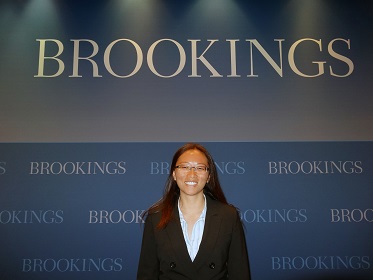In Chronological orger
| Name |
Jasmine Tam |
| MID Class |
MID 2008 |
| Nationality |
China |
| Region |
Hong Kong |
| Organization |
World Health Organization |
"It all started with a promotional email I received from SPPM one day. The idea of studying development in China fascinated me, but never had I imagined that a momentary thought would lead me towards an alternative future. It was Tsinghua University’s Master in International Development (MID) program that started my career in development.
Following graduation from MID, I was privileged to have the opportunity to join the World Health Organization’s Beijing Office. I was a fresh graduate with minimal experience in public health or any other health-related fields, and even though my only knowledge came from an MID assignment on healthcare reform in China, that assignment eventually landed me a position at the World Health Organization.
MID’s diverse international student body with its wide range of perspectives proved to be an invaluable asset to my work. MID itself is like a small United Nations. Our class of 32 was composed of students from more than 20 countries, and so class interactions and social exchanges with these classmates was perfect preparation for my work with the UN. As a Program Assistant, I was required to travel throughout China and coordinate projects with colleagues in various regional offices. My two years training at MID acclimated me to the languages and skills essential for these duties. As a result, I am now both confident and comfortable when I have to communicate with world-class health experts from different parts of the world.
I am still very grateful for that email that led me to a different life and my dream career. Tsinghua may have opened me to China, but MID opened me to the world."
By Jasmine Tam
| Name |
Han Chen |
| MID Class |
MID 2010 |
| Nationality |
USA |
| Organization |
Brookings Institution |

"After graduation from MID, I returned to the US and was hired as a research assistant and project coordinator at the Brookings Institution in Washington, D.C.. It is a nonpartisan think tank that covers a variety of public policy issues. My two years in China were essential for the work I do now, assisting my boss with the publication of his book on China and India. The book examines state-level and provincial-level politics and policy. This includes energy and climate policy, federal-style politics, trade, and socioeconomic policy. From my two years in China, I’d had broad exposure to many of the policy issues firsthand. I also had a better grasp of resources and data sets on China, so I was able to provide supporting research and analysis for the book. What was really useful was that I could understand the Chinese differences in the nature of relationships, how organizations function, and power dynamics; it was essential that I’d lived this experience firsthand.
My experience at Tsinghua included field study and research opportunities that helped me stand out among job applicants. I had done fieldwork in Inner Mongolia, Hebei and Beijing. I had written and translated case studies for the SPPM Case Center. And I assisted my thesis advisor with his journal article publications. Extracurricular activities that gave me an advantage in the job market included volunteering with China Development Brief as a translator and writing articles about Chinese social media through the website Tea Leaf Nation. I also worked as a translator for foreign businesspeople visiting calcined petroleum coke factories in north China. And I frequently attended events through the Beijing Energy Network, Transition Institute, FYSE and other organizations in Beijing – all of which helped to broaden my understanding and exposure to policy issues in China, the expatriate community, and the most pertinent social issues at the local and national level."
By Han Chen